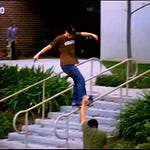In our grandparents’ era a predominant social value was of service to community and stewardship, and in the intervening years it’s shifted to self-serving entitlement, which is the modern cultural norm.
The result is “a tragedy of the commons.”
In economic and social terms, a “tragedy of the commons” occurs when “…many people enjoy unfettered access to a finite, valuable resource, they will tend to overuse it and may end up destroying its value altogether. Even if some users exercised voluntary restraint, the other users would merely replace them, the predictable result being a tragedy for all.”
We are framing the article in something of a historical “A/B test,” offering side-by-side illustrations of city landmarks as they appeared in our grandparents’ generation, vs how they appear today.
It’s not productive or helpful to engage in generational finger-pointing
The Internet is absolutely filthy with that divisive and childish bullshit, and if that’s going to be your sole contribution I’m going to recommend that you return to the Oregonian’s comment page, where you can rage rage rage against the dying of the light with the other cranks.
Internet critics are a dime a dozen; distinguish yourself by getting off your ass and doing something productive.
Let’s focus on solutions
We believe that the damaging effects of this tragedy can be repaired through a restoration of values (which we demonstrate through our own actions) that are more closely aligned to those of our grandparents, which will require collaboration across the generations (and into the youth) to rediscover and restore that which once made our city beautiful.
I’m not one of those people who believes that Portland is ruined, indeed it’s a lovely place of iconic beauty, and as a resident of Austin I don’t believe the two cities are even remotely similar. Those who entertain this belief don’t live in either city.
Portland is iconic in terms of natural beauty and Austin could work for two full decades and still fall far short of Portland’s broad spectrum of food choices.
But Portland is not at its fullest potential, and one major culprit is the pathology of “every man and woman for his or herself” - which similarly rots Austin’s fullest potential - an attitude that many attribute to the homeless, but actually exists in abundance across the socioeconomic spectrum, inclusive to some in public service, ergo: the city investing $724m a year into homeless services, only to see the problem get worse.
I’m a private sector guy who spent a decade of my first post-military career in global manufacturing, working for Fortune 1000 companies like Tektronix and Xerox.
I’m a big fan of a culture of continuous improvement, and have seen the right solution framework and the right team transform failures into massive successes.
I believe we can turn this around by refreshing the screen, so to speak, aligned to a full spectrum considerations of key performance indicators, winking at my friend Ruth Glendinning, a PwC alum who has developed and implemented full-spectrum capital solutions that re-root people in their values by incorporating “soft capital” considerations.
As I discussed at a recent symposium on the reconstruction of post-war Libya, “soft capital” is often worth more than money, for instance: trust cannot be bought and can only be earned, which speaks to why my brother stays in the streets as the good shepherd, continuously “looking for his brother,” paraphrasing both Genesis 4:9 and its spiritual counter: John 10:11.
How can you help? Thanks for asking!
Do you have any memorable historic photos of Portland from the 1920’s - 1950’s? Send them our way!
Other items of interest are newspaper clippings which capture the culture of service to community and stewardship.
Finally: I love hearing stories of cross-generational collaborations which bridge outrage to a culture of stewardship, through action, and one of my personal heroes is a woman named Linda Robinson, who has served as an engine for productive change in the Portland area for generations.
Not content to sequester herself away in some cul-de-sac within a gated community so she can scream at the Internet, Linda has been on the front lines for decades, leading positive and productive change that brings benefit to Portland’s future.
If you know other people like Linda, please give them a platform. We don’t need most people to make a huge change, and we never did.
We need more Lindas, and people like her lovely husband who magnify her productive capacity.















Share this post